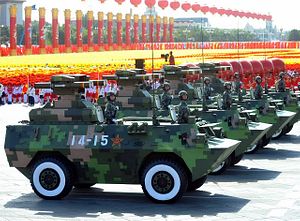Last week, the United States slapped sanctions on the Equipment Development Department of the Chinese military, and its director, Li Shangfu, for military purchases from Russia, citing the Countering America’s Adversaries Through Sanctions Act of 2017 (CAATSA), which allows the United States to impose those sanctions. China not surprisingly responded with outrage and indignation: it summoned the U.S. ambassador, recalled a senior Navy commander from his participation in a symposium in the United States, and called on the United States to “correct its mistake.” The Central Military Commission’s website reports that the acting defense attache at the U.S. Embassy was called in by a senior CMC official.
The imposition of these sanctions, targeting Russia but leaving China with collateral damage, begs a larger question: what is the real-world impact of the sanctions on China? Do they bite at China’s capability to procure military equipment and services, or its abilities to continue operating and fulfilling its requirements?
There are four major areas that the sanctions cover: U.S. property, a visa ban, export denial, and the U.S. financial system. Examining the potential for major impact of each sanction shows where China is most likely to feel the pain, and where it is more or less immune.
The property sanction, described as the “blocking of all property and interests in property within United States jurisdiction,” is imposed on both the Equipment Development Department and on Li Shangfu himself.
Does Li own a string of condominiums along the California coastline? Probably not. Does the EDD, or indeed any department of the People’s Liberation Army, own real estate in the United States? They don’t even own the shops behind the Silk Market in the Jianguomen Embassy District in Beijing anymore.
Having said that, it is certainly not inconceivable that both the department and the director himself have ties, if not openly exposed interests, in U.S. real estate. Wealthy Chinese are known to use proxy buyers when making purchases they oughtn’t to be able to make abroad. But Li Shangfu, trusted and promoted by Xi Jinping, and formerly in charge of space programs in China, is someone who, from the Chinese Communist Party’s official perspective, definitely should not to have the means, wherewithal, or access to buy property in the United States. If he has done so, as so many other officials have, in fact, done, he is subject to far greater trouble in China itself than the United States can ever make for him.
As for the EDD itself, as a relatively new entity created under Xi’s 2016 military reorganization, it would have stringent controls that would not include budget items for American real estate.
The property sanctions are probably not going to have any major effect, therefore. Likewise, the visa ban for Li is not likely to be an issue.
What, then, of the denial of export licenses?
The United States already has significant controls over its export of military-use items to China. As detailed in a brief by Eric Carlson and Peter Lichtenbaum of Covington & Burling Law Firm, at least three Cabinet-level departments enforce a variety of restrictions. The State Department administers the International Traffic in Arms Regulations (ITAR). The Commerce Department, under its Bureau of Industry and Security (BIS), administers the general set of Export Administration Regulations. And the Commerce Department has the job of looking after trade and economic sanctions.
U.S. controls on exporting items for military use in China are so strict that “an export to a Chinese national — wherever that person is located — is considered an export to China. An export license may be required to disclose technology or software source code to Chinese nationals, including those working at U.S. companies,” according to Covington. The requirement has a long reach. “Even if a third-country party employs a Chinese national who will have access to U.S. proprietary technology, that party may be required to obtain a ‘deemed re-export’ license authorizing transfer to the Chinese employee.”
Functionally, therefore, the sanction imposing a denial of export licenses to the Chinese military’s Equipment Development Department is largely redundant with existing practice.
In all likelihood the greatest risk to China, therefore, may result from the fourth area of sanctions, “a prohibition on foreign exchange transactions under United States jurisdiction,” and “a prohibition on transactions with the United States financial system.”
The U.S. Department of the Treasury’s Office of Foreign Assets Control (OFAC) is responsible for controlling the activity of non-U.S. financial institutions (FFIs) engaging in U.S. dollar transactions involving foreign nations.
This is where the U.S. sanctions against China’s military procurement may find their teeth.
The EDD isn’t going to need foreign reserves to buy U.S. equipment and services, but it is doing business with countries around the world that crave a major, convertible currency. Russia is one of them. With over $3 trillion in foreign reserves, China has a wealth of foreign currency to make major acquisitions for its military equipment programs.
If China now wants to enter into any contract with Russia or any other nation that involves U.S. dollars, the conversion or transaction of U.S. dollars to consummate those deals means that they run up against the sanctions just levied by the U.S. government.
Why? Because U.S. dollars, by definition, wherever traded, exchanged, or used as currency, are part of the “United States financial system,” as cited in the sanctions.
China’s response to last week’s U.S. sanctions on its military procurement department might be more than a knee-jerk reaction to loss of face. Indeed, it is probable that China fully realizes that it has just been hamstrung in its use of dollar-denominated contracts to supply and enhance the PLA.

































